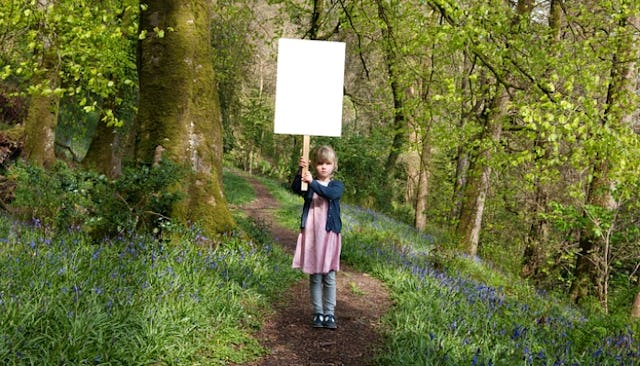I’m Raising My Kids To Be Activists, And Here's How You Can Too

The word activist sounds like a load of laughs, doesn’t it? Yeah, not so much. It sounds dry and wonky at best (and at worst, irrational, farfetched, unrelatable). But never mind the word. Here’s what it actually means when it comes to my kids, and why I can’t imagine any other way to raise humans:
Activists have voices and they know how to use them. Activists follow their passions and learn all they can. Activists look for ways to improve situations. Activists think about more than themselves.
There are far too many ways that kids can have their voices taken away before they even know they have them. Whether it’s sexual abuse, bullying, or they are simply born into our culture where they soak up our norms from day one, I want my kiddos to know they have a voice, and how to use it.
All kids have a will inside of them. We just have to learn how to use it for good. Think about it: What’s the most delightful thing about having toddlers? I’ll give you a hint. The tantrums. Oh my god, the tantrums. If the Olympics gave out medals in tantrums, our tiny overlords would dominate the discipline.
Toddlers’ wills are a good indication of a kiddo learning how to use their voice — not necessarily appropriately, but that will come. We can teach our kids good ways to use their willfulness to stand up for themselves, maintain good boundaries, not simply accept others’ wishes or behavior blindly, be good citizens, and stick up for others.
Here are some great ways to encourage kids to think like activists:
1. Give kids meaningful choices to make, and allow them to make them.
2. Talk about what they feel or think, and how that might influence their decisions.
3. Teach them how to use the telephone to call friends and relatives, or even stores or offices, if they want something or need a piece of information. (As a kid, I remember my mom making me do this. I remember being terrified of speaking with strangers, especially on the phone. But like lots of things, you get better with practice.)
4. When they have problems at school, ask them what they think they can do to solve a situation. Empower them to think through possible scenarios. Do role-playing, work through how things might develop. Let your kids know that they haven’t failed if they can’t solve a problem on their own. Not all problems are for kids to solve.
5. “Who do you think could help you with this problem?” Just like Mr. Rogers’s famous quote, if you’re in trouble, look for the helpers. There are always helpers.
6. Indulge kids in their interests. Maybe your kiddo is really into knights (I mean really into knights). Take them to the library and get them every book they want to read or look at. Draw with them. Take them to museums. Whatever that thing is that they’re into, let them geek out on it for however long they want. Passions are important, and they help us to find what we’re good at.
7. Don’t shield kids entirely from sadness. It’s okay to talk about that homeless person standing on the road median. It’s okay to talk about people who are sick and why they are struggling. Bring it back to the question of “What can we do to make things better?” Sadness is a natural part of life. Shielding our children can be detrimental to their ability to find ways to move forward through their own sadness. Teaching them to engage with it in meaningful ways provides perspective and helps them develop empathy and coping skills.
8. Volunteer as a family. Hook up with an organization that feeds the homeless. Allow your kids to serve. Ask your kids what they think will help, and let them do it. Maybe they want to draw pictures for people in long-term care facilities. Maybe they want to collect pet food and toys for homeless animals. The sky is the limit.
9. Teach them to use money for good. Most of our kids have more than enough stuff. Help kids to think about using money not necessarily for things, but for experiences. Help them set aside a certain percentage every month that they can donate to a charity of their choice (kind of like a tithe).
10. Not everything has to be about activism, but a lot of things can be. Look for opportunities, but don’t get overwhelmed by what you’re not doing. Model for your kids that doing something is always better than doing nothing. We can’t do all the things all the time, but we can all do a little here or there to make the world a better place.
Like everyone else, kids need to feel confident in themselves in order to make their voices heard. I let my kids practice using their voices in safe situations. I know full well that they may turn these weapons against me as they approach their teen years. I do it anyway. I need my kids to have an understanding of their own voices so they can become good people. People who can listen and understand, but also people who can communicate and advocate for themselves and others who haven’t found their voices or who have had them taken away.
Don’t get me wrong — I’ll also teach them that sometimes using your voice comes with some risk. But if they ally themselves with their values, they can feel secure that they are living by their principles and feel proud of themselves.
This article was originally published on